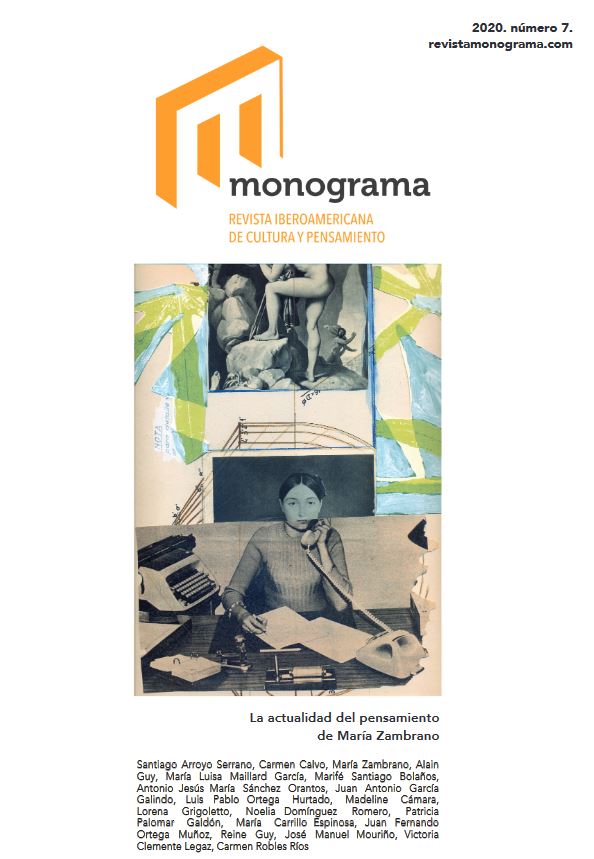A Response to the Orphanhood of the Contemporary Man
DOI:
https://doi.org/10.36008/monograma.202.07.1247Keywords:
Orphanage, Spiritual life, Materialism, Soul, Absolute, Time, Love, Hope, SymbolAbstract
In the late 1980s, María Zambrano, having thought extensively about the crisis in the West, described the situation of contemporary man as orphanhood. Since orphanage is a dead end, the crisis has a positive element, that is, to promote something new. In this article, we aim to expose that the welcome, both in Spain and outside our borders, of Zambrano’s thought may be due to the fact that it speaks directly to the heart and soul of contemporary men. Such profound realities have been discarded by the triumphant thinking in the West, by a mistaken approach of our interiority. To this end, she will resort to a symbolic language, in the conviction that symbols recognize the poetic character of human life and that thought involves much more than the use of concepts, judgment, reasoning and even intuition.
Downloads
References
CALASSO, Roberto (2002). La literatura y los dioses. Barcelona: Anagrama.
CALASSO, Roberto (2002). La literatura y los dioses. Barcelona: Anagrama.
CALASSO, Roberto (2018). La realidad innombrable. Barcelona: Anagrama.
DURKHEIM, E. (2014). Las formas elementales de la vida religiosa. Madrid: Alianza.
MAILLARD GACÍA, M. L. (1997). María Zambrano. La literatura como conocimiento y participación. Lleida: Ensayos/Scriptura.
MAILLARD GACÍA, M. L. (2013). «El exilio en Zambrano. Una vuelta de tuerca a la circunstancia orteguiana», Aurora, n.º 14, Barcelona.
MARCOS, L. A. (2010). «Herencia filosófica de María Zambrano». En ZAmbrAno, M., Pensamiento y exilio (coords. A. Sánchez Cuervo, A. Sánchez Andrés y G. Sánchez Díaz). Madrid: Biblioteca Nueva.
MARKUS GABRIEL (2015). Por qué el mundo no existe. Barcelona: Pasado & Presente.
MARKUS GABRIEL (2016). Yo no soy mi cerebro. Barcelona: Pasado & Presente.
MUÑOZ VITORIA, F. (2011). «Genealogía». En Los sueños y el tiempo. Barcelona: Galaxia Gutenberg, Vol. III, O. C. p. 1379.
ORTEGAY GASSET, J. (1983). «Idea del teatro». En Obras Completas. Madrid: Taurus.
POPPER, K. (1980). La lógica de la investigación científica. Madrid: Tecnos.
RICOEUR, P. (2000).L’unique et le singulier. Lieja: Alice Editions.
STEINER, G. (2001). Nostalgia del absoluto. Madrid: Biblioteca de Ensayo Siruela.
TRÍAS, E. (1994). La edad del espíritu. Barcelona: Ensayos /Destino.
TRÍAS, E. (1997). Pensar la religión. Barcelona, Ensayos / Destino.
ZAMBRANO, M. (2011a). Persona y democracia. En Vol. III, O. C. Barcelona, Galaxia Gutenberg.
ZAMBRANO, M. (2011b). El hombre y lo divino. En Vol. III, O. C. Barcelona, Galaxia Gutenberg.
ZAMBRANO, M. (2014a). «Itinerario». En Vol. VI, O. C. Barcelona, Galaxia Gutenberg.
ZAMBRANO, M. (2014b). «La palabra» (ofrecida al Colegio Mayor San Juan Evangelista acerca de los lugares de la palabra en mi libro Claros del bosque). En Vol. VI, O. C. Barcelona: Galaxia Gutenberg.
ZAMBRANO, M. (2016a). La confesión: género literario y método. En Vol. II, O. C. Barcelona, Galaxia Gutenberg.
ZAMBRANO, M. (2016b). «El freudismo; testimonio del hombre actual» en Hacia un saber sobre el alma. En Vol. II, O. C. Barcelona: Galaxia Gutenberg.
ZAMBRANO, M. (2018). Claros del bosque. En Vol. I. O. C. Barcelona: Galaxia Gutenberg.
ZAMBRANO, M. (2019a). Notas de un método. En Vol. IV, O. C. Barcelona: Galaxia Gutenberg.
ZAMBRANO, M. (2019b). Los bienaventurados. En Vol. IV, O. C. Barcelona: Galaxia Gutenberg.
ZAMBRANO, M. M-46-6.ZAGAjewSki, A. (2006) Dos ciudades. Barcelona: Acantilado.
ZAMBRANO, M. (2010). Solidaridad y soledad. Barcelona: Acantilado.
ZAMBRANO, M. (2017). En defensa del fervor. Barcelona: Acantilado.
Downloads
Published
How to Cite
Issue
Section
License
Copyright (c) 2020 Monograma. Revista Iberoamericana de Cultura y Pensamiento

This work is licensed under a Creative Commons Attribution-NonCommercial-NoDerivatives 4.0 International License.
Esta obra está bajo una licencia de Creative Commons Reconocimiento-NoComercial-SinObraDerivada 4.0 Internacional






